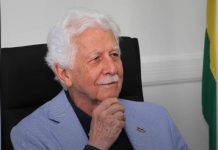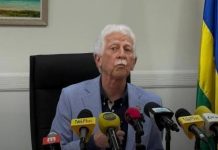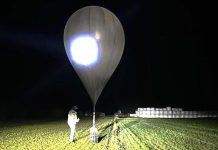Africa-Press – Mauritius. Emmanuel Macron’s visit to Mauritius lasted only a few hours, yet—from the French perspective—it is far from being regarded as a major event, especially given the upcoming 2025 G20 Summit in South Africa; at best, it was seen as a brief, protocol-driven stopover. Nevertheless, in French media outlets, the President’s stop in Port Louis was framed as a moment that was simultaneously historic, strategic, and highly symbolic. From Paris’s vantage point, Mauritius is less an exotic destination than a key node within a broader geopolitical framework in the Indian Ocean.
“A first in 30 years”, framed by geopolitics
The official narrative was set early by the Élysée Palace—and widely echoed: this was the “first visit by a French head of state in thirty years”, embedded within a “dynamic of enhanced exchanges and strengthened partnership” with France’s Indian Ocean neighbors.
Major outlets such as Le Monde, along with news channels (France 24, RFI, Africanews), immediately situated Mauritius within a much broader context: Macron’s five-day African tour, continuing onward to South Africa, Gabon, and Angola. Thus, Mauritius emerged as the “first leg of a five-day African tour”—a launching point for a more ambitious diplomatic initiative.
In this French narrative, the island lies at the heart of a “strategic zone”: the Mozambique Channel and the maritime corridors of the Indo-Pacific, where global trade, energy flows, fisheries, and great-power rivalries intersect.
A tightly structured storyline: security, “strong commitment”, and the blue economy
Editorial framing is remarkably consistent across outlets. On RFI, Africanews, and France 24, the recurring message is that of a President affirming “a strong commitment to the Indian Ocean” and “reinvigorating” relations with a key regional partner.
The same themes recur repeatedly:
Maritime security and combating illicit trafficking: Drugs, illegal fishing, and irregular migration are described as “shared challenges” for Paris and Port Louis.
Blue economy, environment, and marine plastic pollution: Images of Macron aboard the Plastic Odyssey are widely circulated, reinforcing the image of France as a “leader” in ocean protection.
Energy transition and water: The signing of five bilateral agreements on water, energy, and technical cooperation is presented as evidence of a “modern”, public-good-oriented partnership.
Symbolically, the Élysée (and consequently the press) emphasizes a “shared destiny in the Indian Ocean” linking France, its regional territories, and Mauritius.
A visit also designed to bolster France’s image
French media highlight carefully curated moments: a forum on artificial intelligence; a meeting with youth from the region at the Caudan Arts Centre; discussions with Mauritian and French tech entrepreneurs; a visit to the Pamplemousses Botanical Garden; and the inauguration of the new French Embassy.
Collectively, these scenes stage an image of a “green and innovative France”: ethical AI, academic cooperation, the fight against plastic pollution, and “shared” maritime security. Mainstream French outlets place greater emphasis on this modern, aspirational image than on the tangible, day-to-day realities of Franco-Mauritian ties—such as mobility, visas, labor migration, or the diaspora—which remain largely in the background.
Underlying this staging is also a geopolitical concern: in the region, France seeks to reassert its relevance amid the growing influence of other actors—India, China, and Gulf States—in the Indian Ocean. This dimension is acknowledged in analyses of France’s Indo-Pacific strategy, to which the Mauritius visit is explicitly linked.
What French media scarcely capture: the Mauritian emotional response
While the French lens emphasizes “strategy”, the Mauritian reception is overwhelmingly emotional and affective. Regional channels like LINFO.re, local Mauritian media, and social platforms show crowds gathered in Port Louis, waving French tricolors and Mauritian quadricolor flags—scenes of enthusiastic public engagement, selfies, and applause during stops at Caudan or Pamplemousses.
Comments beneath livestreams and videos—from Mauritian media or other platforms—reveal citizens praising “the warmth of the Mauritian people” and expressing national pride at seeing their country in the international spotlight.
Local media also focus more than their French counterparts on two key aspects:
The historical weight of the relationship: References abound to three centuries of French presence, to the homage Macron paid at Pamplemousses to SSR (Sir Seewoosagur Ramgoolam) and SAJ (Sir Anerood Jugnauth), and to the lived reality of Francophonie.
Highly concrete expectations: Economic benefits, investment facilitation, opportunities for Mauritian students in France, and updates to agreements on security or fisheries.
In other words: where Paris speaks of “strategic axes”, Port Louis also thinks of scholarships, jobs, tourism, and purchasing power.
Two intersecting narratives
Ultimately, the French media’s coverage of Macron’s Mauritius visit reveals as much about how France sees itself in the Indian Ocean as it does about the real Franco-Mauritian relationship.
From the French side, the visit is a milestone in a grand narrative: France’s Indo-Pacific strategy, its role in Africa, and the safeguarding of maritime routes. Mauritius becomes a stage on which this story is performed.
From the Mauritian side, the same visit is experienced as recognition: that of a small island state that matters—a country able to negotiate agreements as an equal and to warmly—but unapologetically—welcome the President of its former colonial power.
This divergence is not necessarily problematic. Rather, it highlights the central challenge ahead: aligning France’s highly strategic narrative with Mauritius’s very concrete, socio-economic expectations in the years to come.
For More News And Analysis About Mauritius Follow Africa-Press







